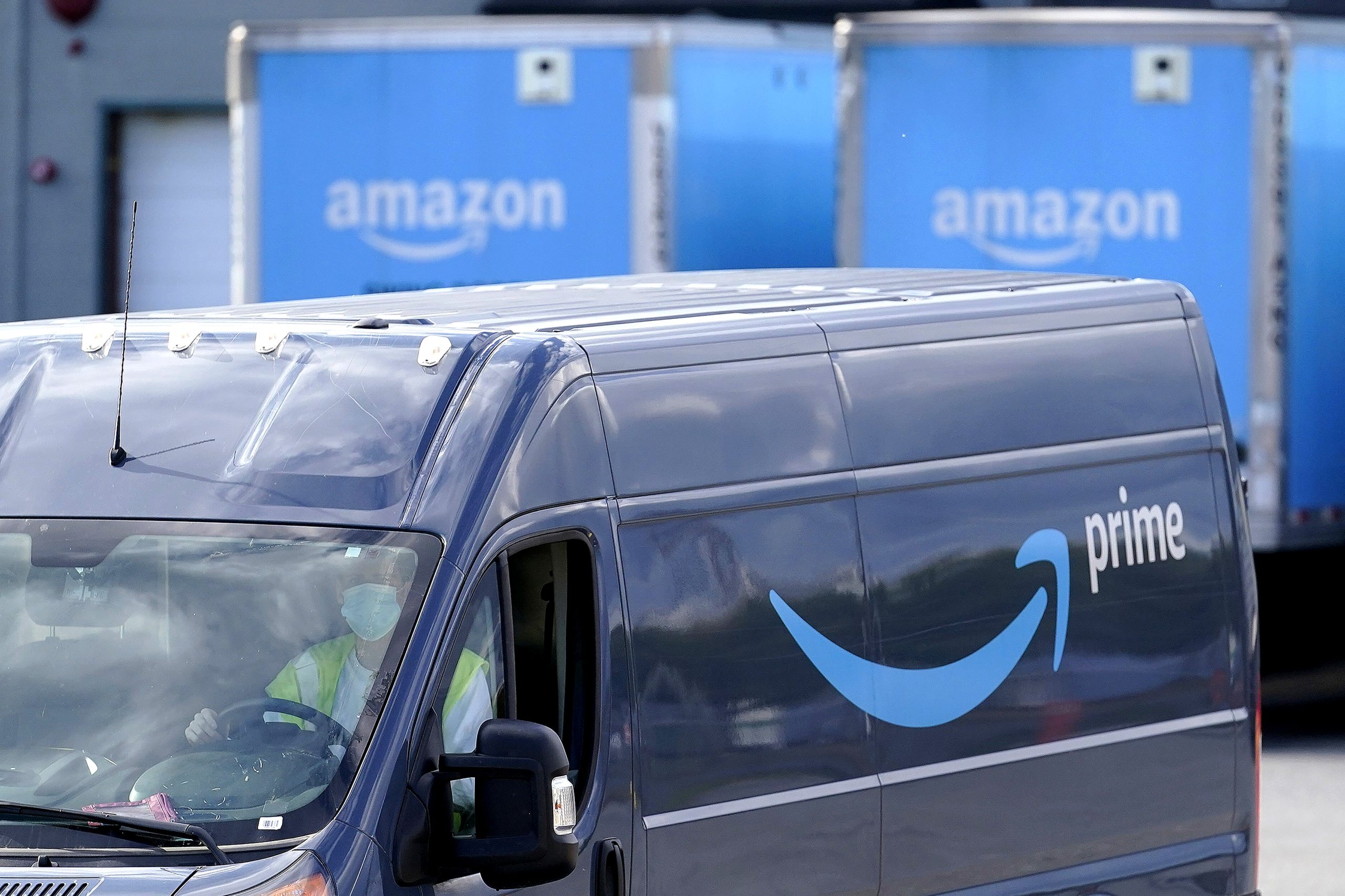Mississippi Today
Amazon, which will get state funding for new data centers, offers its employees help to get abortions

Mississippi lawmakers, who for years have restricted abortion access, recently voted to provide millions of dollars in tax breaks and cash to lure Amazon, which provides its employees money to travel out of state to obtain an abortion.
Gov. Tate Reeves announced in January that Amazon Web Services, a subsidiary of Amazon, the nation's second largest private company, would invest $10 billion in the state to place two data centers in Madison County near Jackson. The Legislature approved a package that included $44 million for workforce training and for infrastructure, multiple major tax breaks and loans of $215 million to bring the Amazon centers to the state. The company is expected to employ at least 1,000.
In 2022, months before the U.S. Supreme Court overturned Roe v. Wade, which guaranteed the national right to an abortion, Amazon informed its employees that the company would reimburse up to $4,000 to travel from a state where abortions are banned to a location to obtain an abortion.
Even as Mississippi legislators approved the Amazon Web Services incentive package last week, they were working on a proposal to ensure voters could not gather signatures through the initiative process to change state law to allow abortion in Mississippi. That legislation passed the House and is pending in the Senate.
Amazon creates an interesting dilemma for Reeves and red state leaders who want to focus on recruiting tech companies that often have corporate policies in conflict with the politicians' rhetoric and positions on social issues like abortion.
Amazon did not comment on questions from Mississippi Today about its abortion policy and how it would impact its Mississippi operations. Amazon already has a warehouse and fulfillment center in Madison County that employs about 1,000 and earlier received incentives from the Legislature and the Reeves administration for that facility. Other Amazon facilities are located in Marshall County near Memphis. According to Reuters and other news reports, the company offers its abortion policy to both warehouse and office workers.
Reeves and Attorney General Lynn Fitch did not respond to questions about Amazon's abortion policy.
The case that overturned Roe v. Wade originated in Mississippi and was successfully argued by the office of the state Attorney General.
After the 2022 Supreme Court ruling overturning the national right to an abortion, one Mississippi law went into effect banning all abortions except in cases of rape and to preserve the life of the mother. A second Mississippi law bans all abortions after six weeks except in cases of medical emergency. The six-week ban would not allow abortions in cases of rape.
House Speaker Jason White, a Republican from West, said Amazon “is a private company” and he is not familiar with the company's health plan.
Mississippi is not the only anti-abortion state with a strong presence by Amazon. A 2022 article by the Austin American-Statesman pointed out that Amazon employed about 11,000 people in Austin. Texas, like Mississippi, has strong anti-abortion laws.
The Austin American-Statesman pointed out other tech companies with operations in Texas provide benefits to help their employees obtain an abortion. Reeves has said many times he wants to focus on luring tech companies in Mississippi.
According to Reuters, the travel benefit is not offered only for abortions. It is provided to travel for other medical procedures. It is offered for an abortion if one is not available within 100 miles. The benefit is provided to U.S. employees and covered dependents, according to Reuters.
This article first appeared on Mississippi Today and is republished here under a Creative Commons license.
Did you miss our previous article…
https://www.biloxinewsevents.com/?p=328083
Mississippi Today
2024 Mississippi legislative session not good for private school voucher supporters
Despite a recent Mississippi Supreme Court ruling allowing $10 million in public money to be spent on private schools, 2024 has not been a good year for those supporting school vouchers.
School-choice supporters were hopeful during the 2024 legislative session, with new House Speaker Jason White at times indicating support for vouchers.
But the Legislature, which recently completed its session, did not pass any new voucher bills. In fact, it placed tighter restrictions on some of the limited laws the state has in place allowing public money to be spent on private schools.
Notably, the Legislature passed a bill that provides significantly more oversight of a program that provides a limited number of scholarships or vouchers for special-needs children to attend private schools.
Going forward, thanks to the new law, to receive the vouchers a parent must certify that their child will be attending a private school that offers the special needs educational services that will help the child. And the school must report information on the academic progress of the child receiving the funds.
Also, efforts to expand another state program that provides tax credits for the benefit of private schools was defeated. Legislation that would have expanded the tax credits offered by the Children's Promise Act from $8 million a year to $24 million to benefit private schools was defeated. Private schools are supposed to educate low income students and students with special needs to receive the benefit of the tax credits. The legislation expanding the Children's Promise Act was defeated after it was reported that no state agency knew how many students who fit into the categories of poverty and other specific needs were being educated in the schools receiving funds through the tax credits.
Interestingly, the Legislature did not expand the Children's Promise Act but also did not place more oversight on the private schools receiving the tax credit funds.
The bright spot for those supporting vouchers was the early May state Supreme Court ruling. But, in reality, the Supreme Court ruling was not as good for supporters of vouchers as it might appear on the surface.
The Supreme Court did not say in the ruling whether school vouchers are constitutional. Instead, the state's highest court ruled that the group that brought the lawsuit – Parents for Public Schools – did not have standing to pursue the legal action.
The Supreme Court justices did not give any indication that they were ready to say they were going to ignore the Mississippi Constitution's plain language that prohibits public funds from being provided “to any school that at the time of receiving such appropriation is not conducted as a free school.”
In addition to finding Parents for Public Schools did not have standing to bring the lawsuit, the court said another key reason for its ruling was the fact that the funds the private schools were receiving were federal, not state funds. The public funds at the center of the lawsuit were federal COVID-19 relief dollars.
Right or wrong, The court appeared to make a distinction between federal money and state general funds. And in reality, the circumstances are unique in that seldom does the state receive federal money with so few strings attached that it can be awarded to private schools.
The majority opinion written by Northern District Supreme Justice Robert Chamberlin and joined by six justices states, “These specific federal funds were never earmarked by either the federal government or the state for educational purposes, have not been commingled with state education funds, are not for educational purposes and therefore cannot be said to have harmed PPS (Parents for Public Schools) by taking finite government educational funding away from public schools.”
And Southern District Supreme Court Justice Dawn Beam, who joined the majority opinion, wrote separately “ to reiterate that we are not ruling on state funds but American Rescue Plan Act (ARPA) funds … The ARPA funds were given to the state to be used in four possible ways, three of which were directly related to the COVID -19 health emergency and one of which was to make necessary investments in water, sewer or broadband infrastructure.”
Granted, many public school advocates lamented the decision, pointing out that federal funds are indeed public or taxpayer money and those federal funds could have been used to help struggling public schools.
Two justices – James Kitchens and Leslie King, both of the Central District, agreed with that argument.
But, importantly, a decidedly conservative-leaning Mississippi Supreme Court stopped far short – at least for the time being – of circumventing state constitutional language that plainly states that public funds are not to go to private schools.
And a decidedly conservative Mississippi Legislature chose not to expand voucher programs during the 2024 session.
This article first appeared on Mississippi Today and is republished here under a Creative Commons license.
Mississippi Today
On this day in 1925


MAY 19, 1925

Malcolm X was born Malcolm Little in Omaha, Nebraska. When he was 14, a teacher asked him what he wanted to be when he grew up and he answered that he wanted to be a lawyer. The teacher chided him, urging him to be realistic. “Why don't you plan on carpentry?”
In prison, he became a follower of Nation of Islam leader Elijah Muhammad. In his speeches, Malcolm X warned Black Americans against self-loathing: “Who taught you to hate the texture of your hair? Who taught you to hate the color of your skin? Who taught you to hate the shape of your nose and the shape of your lips? Who taught you to hate yourself from the top of your head to the soles of your feet? Who taught you to hate your own kind?”
Prior to a 1964 pilgrimage to Mecca, he split with Elijah Muhammad. As a result of that trip, Malcolm X began to accept followers of all races. In 1965, he was assassinated. Denzel Washington was nominated for an Oscar for his portrayal of the civil rights leader in Spike Lee's 1992 award-winning film.
This article first appeared on Mississippi Today and is republished here under a Creative Commons license.
Did you miss our previous article…
https://www.biloxinewsevents.com/?p=359877
Mississippi Today
On this day in 1896


MAY 18, 1896

The U.S. Supreme Court ruled 7-1 in Plessy v. Ferguson that racial segregation on railroads or similar public places was constitutional, forging the “separate but equal” doctrine that remained in place until 1954.
In his dissent that would foreshadow the ruling six decades later in Brown v. Board of Education, Justice John Marshall Harlan wrote that “separate but equal” rail cars were aimed at discriminating against Black Americans.
“In the view of the Constitution, in the eye of the law, there is in this country no superior, dominant, ruling class of citizens,” he wrote. “Our Constitution in color-blind and neither knows nor tolerates classes among citizens. In respect of civil rights, all citizens are equal before the law. The humblest is the peer of the most powerful. The law … takes no account of his surroundings or of his color when his civil rights as guaranteed by the supreme law of the land are involved.”
This article first appeared on Mississippi Today and is republished here under a Creative Commons license.
Did you miss our previous article…
https://www.biloxinewsevents.com/?p=359301
-
SuperTalk FM7 days ago
Martin Lawrence making 3 stops in Mississippi on comedy tour
-
Our Mississippi Home6 days ago
Beat the Heat with Mississippi’s Best Waterparks
-
SuperTalk FM3 days ago
State auditor cracking down on Mississippians receiving unemployment benefits
-
Our Mississippi Home6 days ago
Charlie’s U-Pik: Opening Soon for the Summer Season
-
Mississippi News Video5 days ago
Jackson has a gang problem
-
Kaiser Health News6 days ago
Medicaid ‘Unwinding’ Decried as Biased Against Disabled People
-
Local News2 days ago
Family files lawsuit after teen’s suicide in Harrison County Jail
-
Mississippi Today4 days ago
On this day in 1950








































